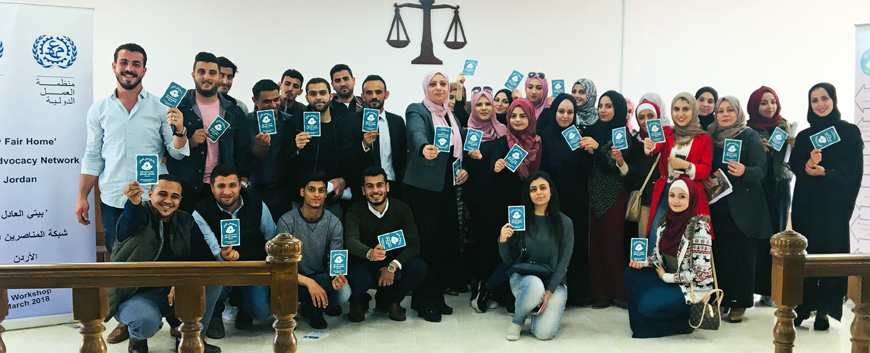IRBID — The national coordinator of a campaign aimed at raising employers' awareness on domestic workers' rights and at changing the negative attitudes and behaviours shown towards domestic workers on Tuesday called for legislative amendments to enhance the protection of domestic workers' rights.
During a lecture held for Yarmouk University's law students, Rama Erekat, the national coordinator of My Fair Home campaign in Jordan, a global initiative of the International Labour Organisation (ILO) and the International Domestic Workers Federation-Jordan, urged amendments to the Labour Law that regulate domestic labourers' rights and duties such as working hours, days-off, leaves and payment.
The lecture touched upon labour rights of domestic workers in the Jordanian law as well as international conventions. Jordan has ratified the ILO’s forced labour convention, but still did not ratify the Domestic Workers Convention 2011, which calls for decent work conditions for domestic workers, Erekat pointed out.
She said Jordanian regulations have proved ineffective as labour inspectors are not allowed to enter houses which are considered private workplaces, to check on work and living conditions, and take action against employers exploiting the rights of their domestic workers.
Inspectors can enter houses only if the domestic worker reported suffering labour exploitation but that is technically hard to prove, according to Erekat, who said that many workers either do not know how to reach legal channels to file complaints or are denied their mobile phones upon arrival and are not allowed to leave the house alone.
There are around 75,000 domestic workers in Jordan, 26,000 of whom do not hold personal documents such as work permits or passports, the national coordinator highlighted, noting that employers usually confiscate these papers to ensure the domestic workers' stay.
The central element of the campaign is to encourage employers to take a pledge in respecting domestic workers’ rights inside their homes, Erekat stated, urging students to sign the pledge and "become change makers in their communities" by promoting domestic workers' right of decent work conditions.
A Jordanian youth advocacy network was recently formed under the campaign, through which 12 Jordanian youth from Amman and Irbid are implementing a series of social media and community outreach activities across Jordan, Erekat noted.
In a statement published on the ILO’s website, Eliza Marks, the ILO technical officer said: “Alongside promoting policy reform and improving implementation of regulations, addressing public perceptions of migrant domestic workers is crucial for securing ground support for their labour rights,” adding that, “Youth — as the next generation of employers of domestic workers — have the power to support a transformation in attitudes and behaviours towards migrant workers."
